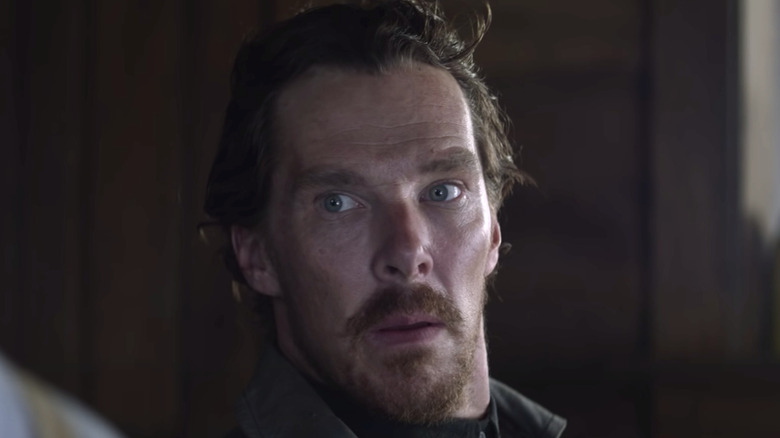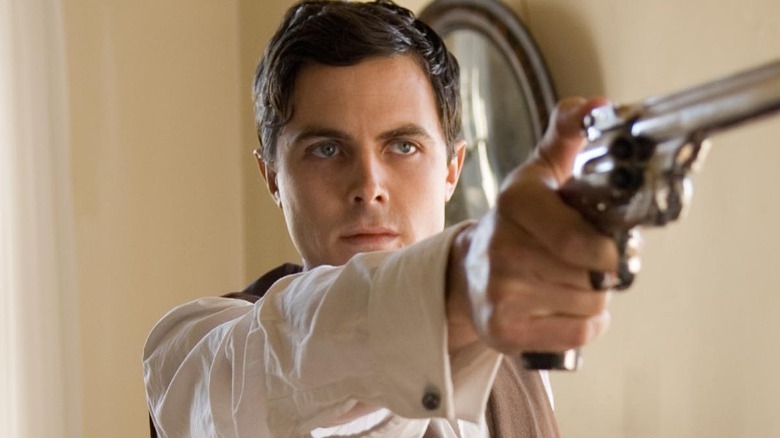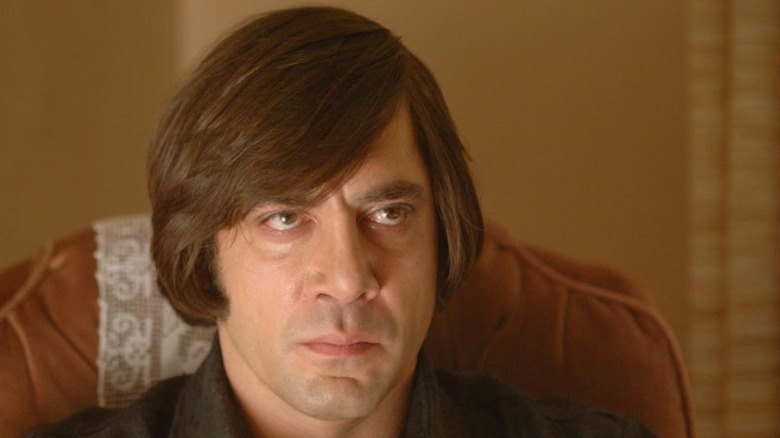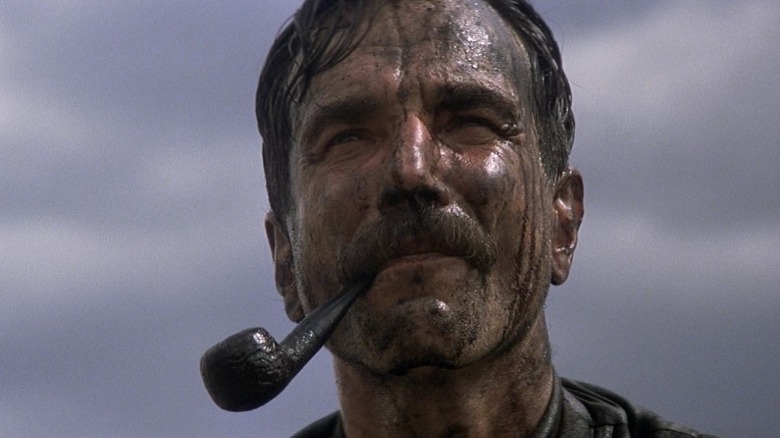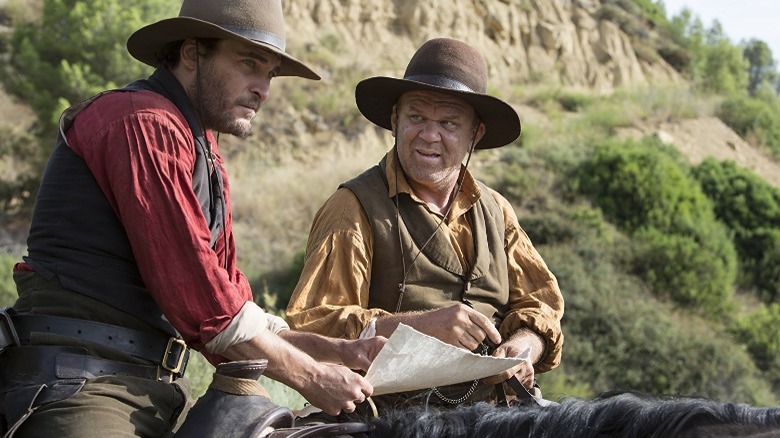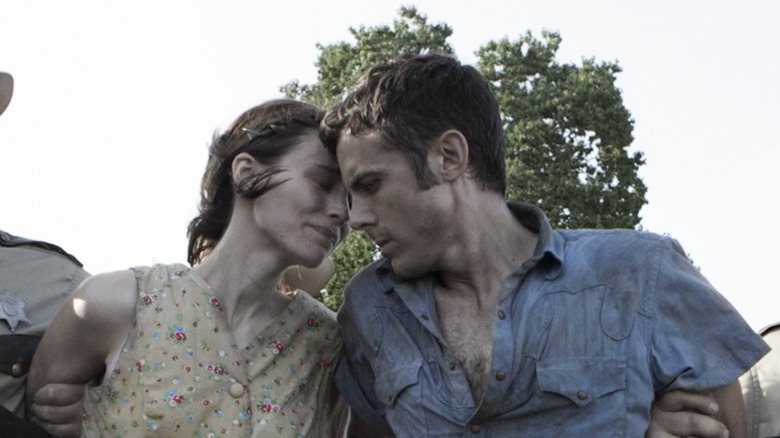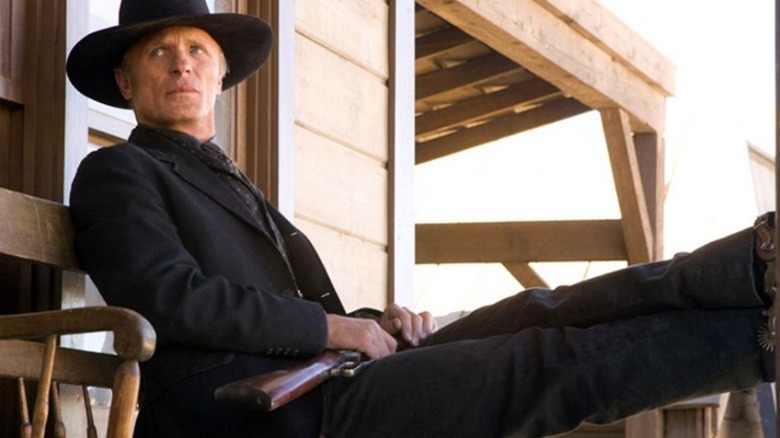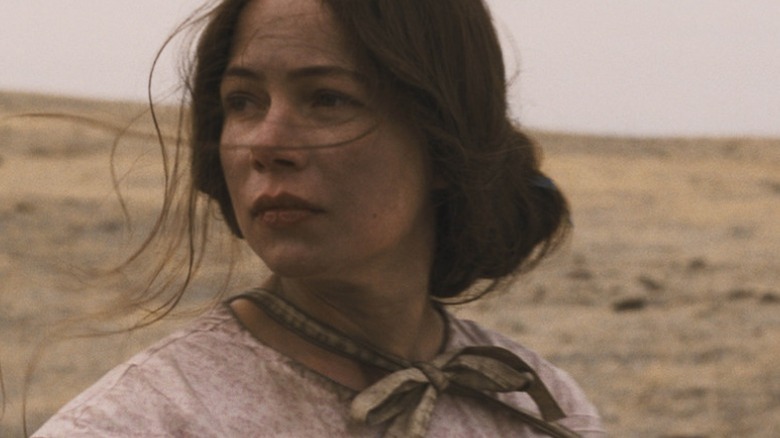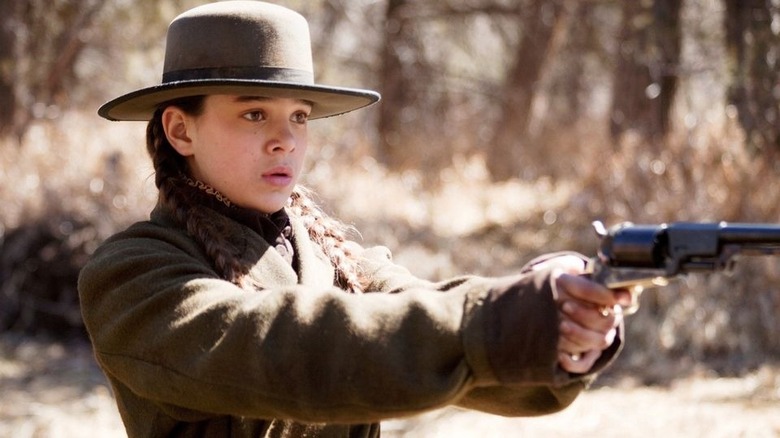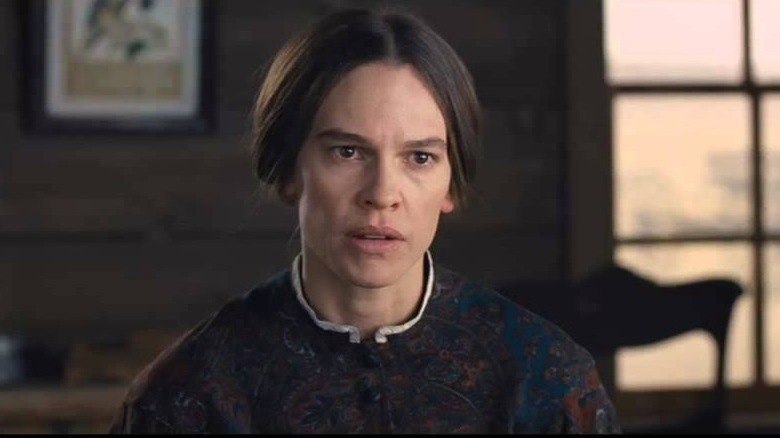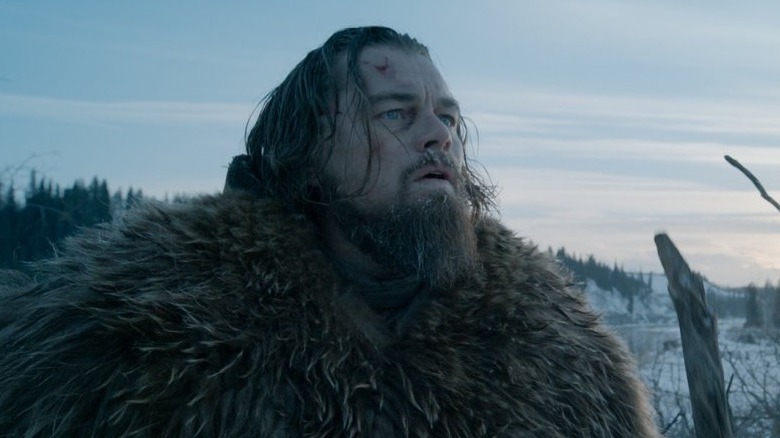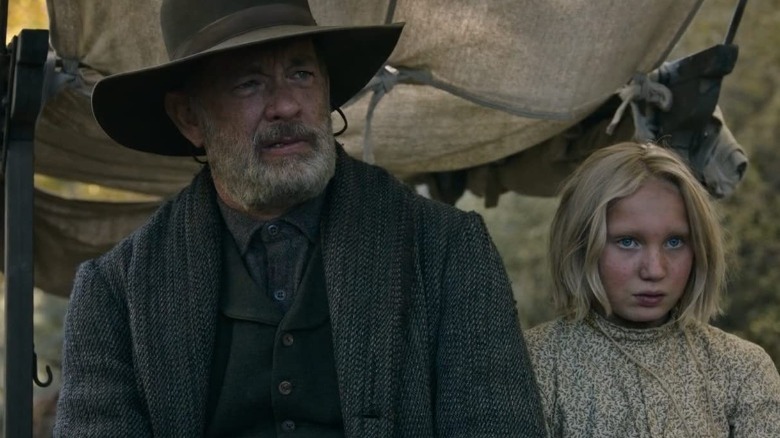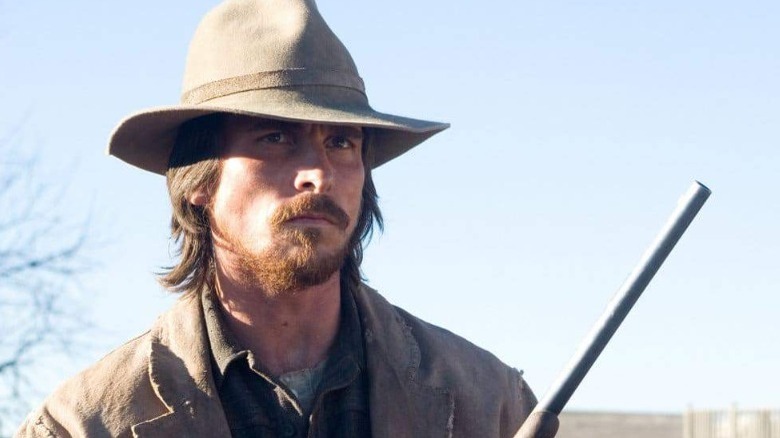Moody Westerns That The Power Of The Dog Fans Need To Watch
Jane Campion's "The Power of the Dog" was released in December 2021 to critical acclaim, receiving multiple Golden Globe nominations and critics awards. A quiet, moody arthouse film from the director of "The Piano," in most years "The Power of the Dog" would still be in just a few theaters, preparing for a modest limited release. It would be beloved by critics, but largely unseen by the rest of the country.
In the current streaming era, however, it holds a distinction very few arthouse releases have: it hit No. 1 in Netflix's Top 10. Millions of households have been introduced by the grace of the algorithm to the modern neo-western: a story that skips the gunfights, saloon doors, and machismo of the traditional Hollywood Westerns in favor of stillness, atmospheric tension, and nuanced acting.
"The Power of the Dog" is an extension of the "Revisionist Western," a subgenre that begins with directors like Sam Peckinpah and Clint Eastwood eschewing the technicolor glory days of John Wayne in favor of grittiness and realistic violence. The moody neo-western hardly even focuses on violence, instead creating a sense of what life on the frontier of civilization was actually like. Sometimes it involves danger and conflict, of course, but in practice, it's nearly all quiet, reflective brooding against a beautiful landscape. Here are moody westerns to watch if you loved "The Power of the Dog" and want more calm, rapturous depictions of life on the wild edges of America as it took shape.
The Assassination of Jesse James By the Coward Robert Ford
It's clear that Andrew Dominick's 2007 masterpiece is a different kind of western from the title alone: "The Assassination of Jesse James by the Coward Robert Ford." At a towering two hours and 40 minutes, it paints a complex and human portrait of outlaw Jesse James, a figure so mythologized that it's easy to forget he was actually a real person. Brad Pitt plays James as a sometimes mercurial, sometimes terrifying man who's starting to feel the full weight and constant burden of life on the run, trying to raise a family under an assumed name.
Casey Affleck anchors the film as the young, star-struck member of James' gang that ultimately turns on him. The story is sprawling and rounded out by an excellent cast that includes Sam Rockwell, Mary Louise-Parker, and Jeremy Renner. But the true stars of the movie are the long pauses, and the moments between. The cinematography from the legendary Roger Deakins paints a gorgeous picture as the gang walks through the lamplit steam from a locomotive, or as Jesse James runs his hand over the tops of wheat blowing in the wind. "The Assassination of Jesse James by the Coward Robert Ford" tanked at the box office because audiences had no way of knowing that its title was meant in irony: The outlaw life sounds flashy and cinematic, but in reality, it's tense, slow, and interminable.
No Country For Old Men
The most famous of this new breed of western is undoubtedly the Coen Brothers' 2007 Best Picture winner "No Country For Old Men," based on the novel by the Pulitzer-Prize-winning author Cormac McCarthy. A sparse, lyrical drama set in Texas in 1980, the story follows a hunter who finds an abandoned case of cartel drug money, a ruthless hitman in pursuit, and a local sheriff attempting to put the pieces together. Frustratingly, though they're masterfully played by Josh Brolin, Javier Bardem, and Tommy Lee Jones, the three characters spend the entire movie just missing one another, and never get into classic western movie standoffs or showdowns.
Instead, as the aging sheriff struggles to reconcile his motivation with what seems to him to be a new breed of violence, "No Country For Old Men" follows the step-by-step processes of survival under harsh conditions. Various characters treat their wounds, struggle to get themselves from one place to another, and take slow, careful measures to protect the all-important stash of money. The most climactic events seem to happen just before the eye of the camera arrives, and the movie literally ends with a character describing a dream that he had. It gives the few action sequences an immense amount of tension and dread, and makes the film a modern classic that any fan of "The Power of the Dog" should watch immediately.
There Will Be Blood
A towering achievement, Paul Thomas Anderson's "There Will Be Blood" had the misfortune of coming out the same year as "No Country For Old Men," thus becoming the runner-up for most of the major awards that year. Loosely based on the book "Oil!" by the muckraking writer Upton Sinclair, it follows the life of oil tycoon Daniel Plainview, embodied by Daniel Day-Lewis in a furiously intense performance that won him his second Oscar. After experimenting with slow, deliberate visual storytelling in art house hits like "Boogie Nights" and "Punch Drunk Love," Anderson let his wide-lens, tracking-shot-heavy style loose in this depiction of the oil industry and the way it revolutionized rural life wherever the telltale black sludge seeped out of the ground.
Daniel Day-Lewis and co-star Paul Dano are worth the price of admission alone, but what truly makes "There Will Be Blood" a unique cinematic experience is the score by Radiohead guitarist Jonny Greenwood. Unjustly disqualified from Oscar contention because it contained some pre-existing compositions (the Academy would later change this rule as a result), Greenwood creates a sonic landscape that mirrors the mix of beauty and dread found in the early 20th century California wilderness. An army of strings dances in staccato bursts and occasional drawn-out sighs, and inventive percussion accompanies the men drilling into the earth for its resources. Greenwood would go on to score several more Anderson films to great acclaim, and also provided the same atmospheric effect for "The Power of the Dog."
The Sisters Brothers
The first English-language film by French auteur Jacques Audiard, "The Sisters Brothers" came and went quietly in 2018, disappointing at the box office despite glowing reviews. But it has wonderful, lived-in performances from Joaquin Phoenix and John C. Reilly as Charlie and Eli Sisters, and deserves a long second life on digital release.
A pair of bumbling but deadly assassins, the brothers struggle to deal with Charlie's violent temper and their own desires for a better way of life. There are gunfights, but they're brief and perfunctory scenes as the brothers change their priorities and allegiances seemingly day-to-day. Eventually, they end up in the bewildering cosmopolitan sprawl of 1851 San Francisco and confront a harsh, timeless western truth: There's no place in "civilized" society for the outlaw, even though as mercenaries they help preserve that societal order on its fringes. Audiard's languid, elliptical filmmaking and the lead performances make "The Sisters Brothers" an overlooked gem.
Ain't Them Bodies Saints
Before he reinvented Arthurian legend in 2021 with "The Green Knight," director David Lowery wowed critics in 2013 with "Ain't Them Bodies Saints," a "Bonnie and Clyde" story filtered through the sweeping, austere lens of a Terrence Malick-style poem. The film wasn't financially successful, but it won acclaim for the direction, score by David Hart, and the performances of stars Casey Affleck, Rooney Mara, and Ben Foster.
Unlike the 1967 classic "Bonnie and Clyde," which broke new ground in presenting the unbridled thrill of the famous criminal couple's wrongdoings, "Ain't Them Bodies Saints" begins with Affleck's Bob and Mara's Ruth having run out of time, the police closing in on them. Bob agrees to take the fall, leaving Ruth free to give birth to their daughter. As he spends four years in prison, eventually escaping to make a dangerous journey to see his family, he sends Ruth letters that ruminate on life, regret, and the passing of time. Foster's local police officer, who becomes interested in Ruth after being part of the posse that corners the young lovers, is a nuanced and thoughtful character as well in a movie that takes classic western stereotypes and gives them all human warmth and complexity.
Appaloosa
"Appaloosa" has plenty of gunfights and showdowns, if you're halfway through reading this list and desperate for some action. But gunplay takes a backseat in this modest western directed, co-written by, and starring Ed Harris. He plays Virgil Cole, a lawman for hire who agrees to help towns beset by criminal gangs restore order, as long as he and his deputy Everett Hitch (Viggo Mortensen) have unfettered authority. Their latest assignment is going swimmingly until young widow Allie French (Renee Zellwegger) catches Cole's eye.
Just like the brothers in "The Power of the Dog," Cole and Hitch find themselves shaken irrevocably by the sudden influence and presence of a woman in their lives. In "Appaloosa," as a love triangle swiftly becomes an even more complicated shape, it becomes clear that although human affection is the dance that keeps our species spreading to new places, it's nearly impossible to balance the liabilities and unpredictability of love with the enforcing of the law in a lawless place.
Meek's Cutoff
Kelly Reichart's "Meek's Cutoff" will make millennials nostalgic for the classic computer game "The Oregon Trail." But while the classic, primitive video game reduced the experience of crossing vast distances by wagon into an episodic series of fun, simple challenges, "Meek's Cutoff" drives home the harsh, boring reality of what it would have been like. A small group of pioneers deal with the harsh desert heat, dwindling supplies of water, and relentless monotony as they walk alongside their oxen and laden horses day after day. Eventually, they begin to suspect their guide, frontiersman Stephen Meek, has no idea where he's going.
The film goes for long stretches with virtually no dialogue, and slows down along with the settlers whenever they have to cross a river, carefully unpacking and carrying across the belongings they can't get wet. No one even speaks in "Meek's Cutoff" for the first 14 minutes. In a metatextual touch, the film is shot in an almost square aspect ratio to imitate the cheery, classic westerns of the studio days, making the mind even more aware that what we're seeing isn't a Hollywood fairy tale but a grueling, elliptical glimpse of a more realistic moment in the past.
True Grit
Three years after "No Country For Old Men," the Coen Brothers went even more traditionally western with an adaptation of the Charles Portis novel, "True Grit." A bleakly funny story that has previously been made into a more conventional John Wayne movie, the Coens' version stars Jeff Bridges, Matt Damon, and Hailee Steinfeld as two lawmen and a teenage girl in pursuit of an outlaw.
Steinfeld's Mattie Ross steals the show as a headstrong, relentless pursuer of justice for her father's murder. There may be gun battles in this film, but no sharpshooter is as deadly as Mattie Ross when she's negotiating prices for her father's ponies with an unsuspecting tradesman, and neither of the lawmen display as much dedication. Ultimately, the film manages to be both outright hilarious and granularly human in its depiction of a wild, unforgettable journey. "True Grit" would earn several Oscar nominations and, unlike most of the films on this list, was undeniably popular at the box office to boot.
The Homesman
It's not just that conditions on the American frontier were harsh. Settlers were so beset by hardship, loss, and death that they often could lose their grip on sanity as a result, and without a deeper understanding of the psychological effects, the term "prairie madness" was used as a catch-all term for anyone who just sort of lost it. In "The Homesman," Hilary Swank plays a spinster saddled with the unfortunate task of transporting three other women driven mad by their circumstances to a church that takes in the mentally unwell. She enlists the help of a thief played by Tommy Lee Jones (who also directs) to help her in the perilous journey.
What begins as an already grim adventure becomes a devastating mediation on loneliness, and the balance between Swank and Jones as the two leads of the film lets Jones tell a feminist story through the eyes of the half-hero, half-outlaw that westerns have typically focused on instead.
The Revenant
Remembered mostly for a startlingly realistic bear attack, "The Revenant" is a survival story like no other. What it may lack in nuance, as Leonardo DiCaprio grunts, screams, and crawls his way to an Oscar during a straightforward revenge narrative, it makes up for in artistry. Director Alejandro González Iñárritu, fresh off the success of "Birdman," includes beautiful, psychedelic shots of the frozen wilderness as DiCaprio's Hugh Glass makes a grueling trek to avenge his murdered son.
"The Revenant" is epic and sprawling, with facets of every kind of new western at once. It's easily more brutal and visceral than anything Sam Peckinpah could have dreamed up in the '70s, but has a poetic, hazy appreciation for the breathtaking vistas under which all of this violence is taking place. The bear attack remains a stunning achievement in CGI, but the rest of the film is just as memorable and striking.
News of The World
"News of the World" focuses on frontier society before the information superhighway existed. Set in the chaotic, post-Civil War south in 1870, Tom Hanks stars as Captain Jefferson Kidd, a former soldier who ekes out a living riding from town to town. He reads the news, national and local, to gatherings of townspeople before the existence of mass media, and before even literacy was commonplace. Kidd takes charge of a young orphan girl who had been raised by Kiowa Native Americans for several previous years, bonding with her despite a language barrier as he attempts to take her to kin of her birth family.
Along the way, the pair encounter mercenaries, deal with the unforgiving wilderness, and see firsthand how disparate and secluded the country is in the late 1800s. In Texas, a cattle baron has taken control of an entire county as a de facto warlord, and even attempts to dictate what Kidd presents as the "news." Slowly, Kidd's relationship with his young charge leads him to confront deep feelings of grief and loss that he's been avoiding for years. Who better than Tom Hanks to channel the complicated, divisive feelings that lingered in the country at large after the Civil War?
3:10 to Yuma
Like "The Power of the Dog," James Mangold's "3:10 to Yuma" is concerned with masculinity. Christian Bale's Dan Evans is a one-legged veteran of the Civil War attempting to lead a quiet life as a rancher. As a wealthy landowner tries to intimidate him into selling his farm, his wife and son begin to resent him for failing to take the law into his own hands. He's a figure who encapsulates the central tension of the lawless West: Order only exists in society because we all tacitly agree that it does. If we act outside the law, it would be chaos. So what is the "right" or "manly" thing to do?
Evans sees a chance to prove his mettle when ruthless outlaw Ben Wade (played by a charming Russell Crowe) needs to be taken through the wilderness to catch the prison train mentioned in the title. What follows is the most conventional western-type action of any film on this list, as an impromptu posse has to fend off several dangers to accomplish their goal, their efforts underlined by Evans' existential dilemma. Bale and Crowe deliver fine performances as dueling images of the chaos and order that holds society together by a thread.
